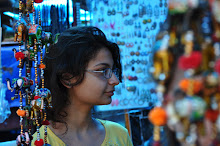Of late, amongst other interesting [possibly more surprising, and admittedly more discussion-worthy] things, I've taken to strolling through Quora. Fun place, because you don't feel like you're barging in on people unexpectedly, but you still get in on often-great responses to sometimes-great queries about this or that or that or that. Or that. Or even that. There's everything left to be learnt, yessir.
One such stroll led me to a question that amused me at first - How should parents ask their children's friends to address them, and for what reasons? I said I was strolling, quit judging.
As I read the answers posted [you can read them here, sign up/in because it'll be worth it], I couldn't help but feel like the West has been missing the point altogether. Why do you want a special name for yourself anyway? Why can't that kid's name for you be mass produced and in common with all his peers, just like his breakfast and his innerwear? Are you more special to that kid than his breakfast or innerwear? Okay, touchy topic.
As I read the answers posted [you can read them here, sign up/in because it'll be worth it], I couldn't help but feel like the West has been missing the point altogether. Why do you want a special name for yourself anyway? Why can't that kid's name for you be mass produced and in common with all his peers, just like his breakfast and his innerwear? Are you more special to that kid than his breakfast or innerwear? Okay, touchy topic.
Still, the question prompted a quick checklist of why India's 'Uncle/Aunty' tradition gets my enthusiastic vote. I quite like that this list of benefits isn't restricted to friend's parents.. we're inclusive like that! Obviously, not all points apply to every Uncle/Aunty I've ever spoken with. So if you're one, do try and look at the brighter side of points.. even if points are supposed to be zero dimensional.
Since this is the closest you may ever get to a rational, public dissection of a rare moment of national pride, be sure to think about it after you switch tabs.
Since this is the closest you may ever get to a rational, public dissection of a rare moment of national pride, be sure to think about it after you switch tabs.
- At the very least, I see the 'Uncle/Aunty' system as acknowledging that the said adult is older than I, period.
I don't have to respect a person in order to respect their age and the experience [whether superior or misguided] that comes with it. Nor do I need to bother with a silly speculation about relative worth and dignity and whatnot to call someone Uncle and not Mahesh or Mr Mahesh. I'm just acknowledging the age difference, nice and simple.
- I don't have to know you to call you Aunty! That makes things civil more often than not. Doesn't mean you're my favourite.
You could be that sweaty, smelly, whiny lady on the train - especially the one with all that hair left open for me to nuzzle - who insists on sharing the sorrows of a stubbed toe from Vashi to Kurla, throughout realigning her hip against mine and digging her inconsiderately designed, boxy, brass-studded purse into my ribs. I might want to growl at you and stamp all your toes and donate a hairclip or two while I'm at it, but I will still call you Aunty when I ask you to move a wee bit away from my crotch. I RESPECT YOUR AGE, ANONYMOUS AUNTY. I also don't like you very much.
- Continuing from the lack of like involved, this system simply isn't dependent on how close you are to that [older] adult.
If you're close and/or both want a different, special name or if your equation changes in some way that warrants a new term, the path to redressal is clear. If not, no harm done! Since all our languages provide a host of names for older male and female relatives, it's not like 'Uncle/Aunty' have any special or familiar overtones. So my parents' closest friends that I may or may not be close with, my favouritest neighbour from when I was a kid, my boyfriend's mother, the security staff or cashier at a mall, the stranger walking ahead of me and that evil lady on the train can all be my Aunties. And no one finds this offensive! They might if they give this universality some thought, but at least until I pointed it out, no one minded.
- Along with ^, it also absolves you of the need to know the adult's first name.
For those of us used to the UAT [cool cultural feature merits an acronym, no?], I think that's actually a fairly unlikely thing for to know, the first name of your friend's parent. I can always refer to them as "X's mom" should the need arise. It's also very convenient during introductions, moments of forgetfulness and evaluations of occupied memory space in one's mind.
- Loses the stiff formality of Mr/Mrs, but retains some measure of distance anyway.
That way your friends won't wind up with a complex about your equation with their parents. Tell me how that's undesirable.
- Usable regardless of the language you are speaking!
As in case of other English words [think "hello/okay/bye/side please/thenks"], these terms have percolated across languages and are understood and accepted by many-to-most even in rural India. I've actually had someone insist that "okay" is a Telugu word, so you'll just have to trust me on this percolation theory. - Once it catches on, it can provide inspiration for popular dialogues, weirdly catchy songs, even the odd search history preference.
Deny any of it and you would be labelled low on creativity, and woefully ignorant of your own culture.



